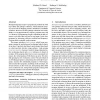Free Online Productivity Tools
i2Speak
i2Symbol
i2OCR
iTex2Img
iWeb2Print
iWeb2Shot
i2Type
iPdf2Split
iPdf2Merge
i2Bopomofo
i2Arabic
i2Style
i2Image
i2PDF
iLatex2Rtf
Sci2ools
200
click to vote
ASPLOS
2009
ACM
2009
ACM
Leak pruning
Managed languages improve programmer productivity with type safety and garbage collection, which eliminate memory errors such as dangling pointers, double frees, and buffer overflows. However, because garbage collection uses reachability to over-approximate live objects, programs may still leak memory if programmers forget to eliminate the last reference to an object that will not be used again. Leaks slow programs by increasing collector workload and frequency. Growing leaks eventually crash programs. This paper introduces leak pruning, which keeps programs running by predicting and reclaiming leaked objects at run time. It predicts dead objects and reclaims them based on observing data structure usage patterns. Leak pruning preserves semantics because it waits for heap exhaustion before reclaiming objects and poisons references to objects it reclaims. If the program later tries to access a poisoned reference, the virtual machine (VM) throws an error. We show leak pruning has low ove...
| Added | 22 Nov 2009 |
| Updated | 22 Nov 2009 |
| Type | Conference |
| Year | 2009 |
| Where | ASPLOS |
| Authors | Michael D. Bond, Kathryn S. McKinley |
Comments (0)

